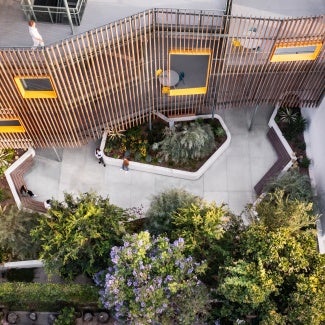Design for Aging Review Award
Recognizes architects who demonstrate innovative design solutions to improve the quality of life for older adults.

For more information on opening and deadline dates, please see the AIA Awards FAQ.
Recognizing innovative design for older adult living
The Design for Aging Knowledge Community invites architects, designers, and providers to submit projects for consideration in Design for Aging Review, Cycle 17.
The Design for Aging Review includes a juried award and access to digital content and educational programs that showcase communities representing conscientious surroundings that advance environments for senior living. The comprehensive review of architectural design trends for the aging will become a reference for providers, developers, users, advocates, architects, interior designers, landscape architects, and other design professionals.
This award furnishes architects and their teams the opportunity to demonstrate innovative solutions that improve the quality of life for older adults within specific project constraints.
Questions? Email AIA Awards
All entries must meet the following requirements for each of the entry categories:
- Open to AIA Members and non-members based in the United States or Internationally; however, there must be an identified US-licensed architect on the project.
- Projects submitted by jury members or by the organizations they represent, and projects that included jury members on their team, will be disqualified.
- All entries must receive permissions from owners and other team members and acknowledge that permission as part of the submission. Designers and providers should collaborate on completing the form, as there likely are some questions better answered by one group or the other.
- Projects may only be submitted once, under one category. If a project can be classified under more than one category, applicants are encouraged to choose the one they think best applies to their project.
Schedule
For more information on opening and deadline dates, please see AIA Awards FAQ.
The following must be submitted for the project to be eligible:
- Data: All mandatory fields must be completed. The data that is submitted should identify the project, explain the major design challenges, describe the functional and aesthetic qualities, and provide relevant statistical information about the project.
- Images (where applicable): Images must be submitted in .PDF format. All submitted materials (photographs and plans) must be clearly labeled with captions or descriptions. Note that selected projects will be required to resubmit all images in a format that is suitable for publication.
- Project data will be entered into the required fields. Omission of relevant data with no explanation may lead to an entry's disqualification.
- All items to be uploaded must be one (1) PDF file smaller than 25 MB.
Please note the following four (4) categories:
- Built projects: The built form(s) and related site work, whether it is an entire campus or a wing of a building. Must be completed after 1/1/2018.
- Small Projects: Built or Unbuilt ($3 million construction cost or less): Supportive elements of the built environment, either as small stand-alone projects or as a part of larger projects, including interior and/or outdoor spaces.
- Affordable Projects: Residents can obtain housing with a mix of income from 30-60% average median income (AMI) and should also meet Inclusionary Zoning needs. Housing types should be for independent senior and assisted living. Mixed income can include a mixture of affordable and market rate units within the project.
- Unbuilt Projects: Projects may be in the planning phase only, with the intention to build. They could be community or campus plans, master plans, or re-positioning plans. Also, building projects that are currently in the early stages of design, which demonstrate significant ideas or innovations, should be submitted in this category.
Entry fee: Single project submissions are $450 each. Submitting the same project to additional award categories costs an extra $100 per category.
Submission process: Visit the submission site for full submission details prior to the deadline. After logging in, you may view the entire submission site, and save your submission as you work to complete it. You will not be asked to pay until your submission is complete.
A sample application can be viewed here: 2023 Design for Aging Review Sample Application
A jury of architects, allied professionals, and care providers for the aging will categorize and recognize submissions to be published and exhibited as follows:
Awards of Merit: Projects that represent advanced design concepts, research, and solutions sensitive to the needs of an aging population. Projects submitted in the Built, Small Project, and Affordable categories are eligible for a Merit Award.
Special Recognition: Projects that, while not Awards of Merit, display special features or innovations that warrant acknowledgment as exemplary, trend-setting, or innovative. Unbuilt projects are only eligible for Special Recognition.
Published: Projects that offer distinction and notable competency.
All selected projects will be published in a digital DFAR17 compilation. In addition, the Merit projects will be published in a Supplement for Environments for Aging, sent to approximately 23,000 subscribers. The selected projects will also be exhibited at one or more of the following conferences: LeadingAge Annual Meeting and Expo, Environments for Aging Conference and Expo, as well as the AIA Conference on Architecture.
2023
Jennifer Sodo, AIA, Chair, EUA, Milwaukee
Winifred Elysse Newman, Assoc. AIA, Clemson University, Clemson, S.C.
Philippe Saad, AIA, DiMella Shaffer, Boston
Margaret Suit, Erickson Senior Living, Catonsville, Md.
Lisa Warnock, Thoma-Holec Design, Portland, Ore.
2023 winners
Aegis Living Lake Union, Seattle
Cooperwood Senior Living, Flowood, Mississippi
Gramercy Senior Housing, Los Angeles
Rose Villa Senior Living, Portland, Oregon
Stonewall House, Brooklyn, New York
Past winners
Contact us for information on prior years' winners.



